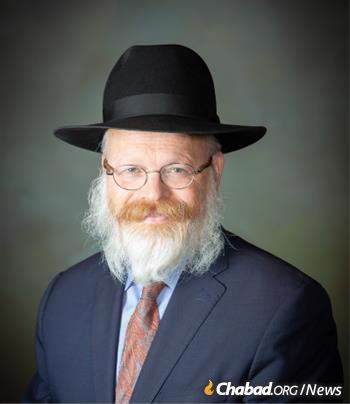Death is something everyone encounters sooner or later, though none of us wants to face it. The loss of a loved one invariably invites us to ask life’s most important questions—questions that beg answers: What happens to the soul after the death of the body? Is there an afterlife, and if so, what’s it like? Is there the possibility of ongoing connection and communication between those who are alive and those who have passed? Where does a lifetime of love go when the recipient is no longer able to reciprocate? Can we mend broken relationships with those who have left us?
Drawing on 36 years of rabbinic experience, Rabbi Avraham E. Plotkin, spiritual leader of Chabad-Lubavitch of Markham, Ontario, published Seven Conversations With Jerry, in which he sets about answering some of these questions from a Jewish perspective.
Set as a novel, the book couches what can sometimes be heavy subjects in a series of encounters between a rabbi and a grieving family. And like every good novel, it has its fair share of surprise twists, mysteries and complex interpersonal relationships.
In this interview, the rabbi, who is a popular presenter on Chabad.org/video, shares some of the genesis of the book and what he set out to accomplish with it.
Q: It’s not common for rabbis to write novels. What prompted you to write this book?
A: When I entered the rabbinate and began helping people through the process of burying a loved one and mourning through shiva and beyond, I realized that something was missing. There are many good books telling people what to do, but we have precious little telling them what to feel, as well as what is happening on a soul level to their departed relatives and to themselves.
Over the past two decades, I slowly collected what I had learned and wrote it up, but I found that it was too dry and would be difficult for people to read at a time when they are going through so much. So I wrote it up as a novel, and this is what you now see.
Q: What sources did you use?
A: Some of this is from the Talmud, classic Kabbalah and Tanya, the foundational work of Chabad Chassidism. But a lot of it comes from what we learned from the Rebbe [Rabbi Menachem M. Schneerson, of righteous memory] in his talks following the loss of his father-in-law and predecessor. It was clear to everyone that the Rebbe related to his father-in-law as a real presence in his life even decades after his passing, and the way he viewed the eternality of the soul has applications for the rest of us as well.
Q: The novel is fresh, but the protagonists seem familiar. A North American rabbi ministering to a family that is financially well-to-do yet deeply dysfunctional. Is this a reflection of your community or anyone you know?

A: Not at all! The plot is entirely original. However, many elements of it are based on dozens of people I have encountered in my decades in the rabbinate. For example, there is a female Holocaust survivor who is disgusted by her body after it was tattooed and otherwise ravaged by years of Nazi slave labor. After finding out that she is pregnant, she discovers new life and sweetness in a place where she saw only death and destruction. This is based on the wife of a congregant of ours.
Q: The book is recommended for what type of audience?
A: It was written for people experiencing loss, but it is really for anyone.
We all have souls, and we all can benefit from learning how there is more to life than what meets the eye, and that we are part of a human chain that began with Adam and is leading up to the era of Moshiach.
While the context is Jewish, the truths contained are applicable to non-Jews as well.
Q: Were there particular encounters you’ve had that pushed you to write this book?
A: I’ve unfortunately counseled too many children who resisted saying Kaddish for parents with whom they had a sour relationship.
At times, the child felt abused or otherwise mistreated. On the opposite end, there were children who felt guilty for the way they failed to honor their parents.
Both can be guided to let go and make amends. The book walks through the unfamiliar experience of making peace with someone who has passed on following traditional Jewish methods.
Q: In your introduction to the book, you mention the sudden passing of your youngest son, Zalmy. In what way did his loss influence the book?
A: The truth is that the book was pretty much final by that point, so I did not revise much. However, I found that I personally connected to many of the concepts in a much truer way than I had before.
Zalmy was just 14, and my wife and I felt, and still feel, a desperate need to love him and know that he is reciprocating our love, that he is still with us as we are with him. Rereading some of the ideas that I myself had written, I found myself being comforted and reassured.
Q: What do you hope readers will walk away with?
A: We all have big questions. But during shiva, we tend to focus on petty things in part to distract ourselves and to protect ourselves from asking questions we don’t have the keys to answer. I hope that this book will allow people to take a step back, gain perspective and clarity, and live better, more spiritual lives as a result.
Written as a novel, I hope people will read it during shiva, when they are searching and open, and come away changed.
Published by Ufaratzta Press, “Seven Conversations With Jerry” is available on Amazon and in Jewish bookstores. Bulk discounts are available for synagogues and Chabad centers.








Join the Discussion